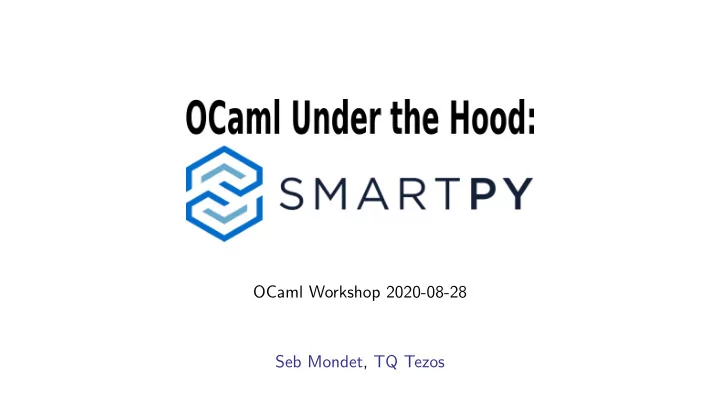

OCaml Workshop 2020-08-28 Seb Mondet, TQ Tezos
The Who Software Engineer at TQ Tezos → Improve Tezos Ecosystem Smart Contracts. Helping partners get up to speed and build on Tezos. Standardization efgorts. Contribute to tooling, incl. SmartPy. I’m not the main developer of SmartPy, cf. also François Maurel → Main architect. Roland Zumkeller → Compiler + Decompiler + … Rodrigo Quelhas → Infrastructure + WebUI. Core tezos/tezos development.
Tezos Tezos is a cryptocurrency usually well-known in the OCaml world: Proof of Stake — Baking On-Chain Governance — Self Amending Protocol Smart Contracts OCaml implementation
Michelson The “VM / scripting language” of Tezos. Programs that the whole network run & validate. Stack-based & functional core. Clear semantics and typing rules. Emphasis on formal methods. Writing smart-contracts is HARD … Bugs can be very expensive (money locked or stolen), VM-languages like Michelson are very low-level.
SmartPy Python library for writing smart-contracts on Tezos Generate Michelson + Test Contracts Tooling: WebIDE and CLI tools, Simulate & analyze, Deploy & interact. Big mix of OCaml, Python, and Javascript.
Why Python One of the most popular languages in the world, Intuitive syntax, Good meta-programming capabilities, New users believe they already know it → Tezos Gateway Drug :)
Python script to Simulation/Michelson SmartPy programs generate SmartML expressions SmartML is an imperative, type-inferred intermediate representation SmartML is implemented in an OCaml library: Compiled to Native (tests, CLI tools) and to Javascript (WebIDE, end-user CLI application), Type inferrence, Program Analyses, Interpreter, incl. test scenarios language, Compiler to Michelson (with many Michelson to Michelson optimizations). In progress: a decompiler.
Example 0: Full Contract
WebIDE: Demo A.k.a. webide-demo.mp4 .
WebIDE: Implementation What happens: Python code executed with the Brython interpreter. Constructs SmartML Programs. Type inference / checking, Simulation Compilation Back to the UI to construct the HTML “right pane” Contract enters the js_of_ocaml world:
SmartPy-CLI # Install on any Unix with `npm` & `python` (3): sh <( curl -s https://smartpy.io/dev-202007…/cli/SmartPy.sh ) local-install-auto # Compile and run tests: ~/smartpy-cli/SmartPy.sh test < myscript.py > < output-directory > # Just compile a given contract within a python script: ~/smartpy-cli/SmartPy.sh compile welcome.py "Welcome(12,123)" /tmp/welcome
“Portable” OCaml CLI App dependencies, and call the main OCaml application if available : A bit slow (esp. startup), but does the job. SmartPy.sh is a bash script … Knows how to install the smartpy-cli distribution: python and JS fjles + npm smartml-cli.js is the JS “main” Concatenation of a prelude.js that loads npm packages, and the result of js_of_ocaml .
Spice (rule (targets smartml-cli.js) (deps node_main.bc.js prelude.js) (action (with-stdout-to smartml-cli.js (progn (run cat prelude.js) (run sed "s@joo_global_object.console.log(cmd);@// removed console.log@ ; \ s/.execSync(cmd/.execSync(cmd,{stdio: 'inherit'}/" node_main.bc.js) (echo "}) ()\n") )))) (that sed is fjxed upstream → ocsigen/js_of_ocaml#979 )
Pre-hack Dot JS // ... const library = { bs58check: require('bs58check'), sodium: require('libsodium-wrappers-sumo'), }; // ... (async() => { await library.sodium.ready; await library.bs58check.ready; global.sodium = library.sodium; // __INSERT_HERE__
Libsodium & Friends (* ... *) module Ed25519 : sig val verify_signature : Crypto_bytes.t -> message:Crypto_bytes.t -> public_key:Crypto_bytes.t -> bool [@@js.global "sodium.crypto_sign_verify_detached"] val sign : message:Crypto_bytes.t -> secret_key:Crypto_bytes.t -> Crypto_bytes.t [@@js.global "sodium.crypto_sign_detached"] (* ... *)
Some Bit Flipping
Error Messages Python interpreter SmartML Type inference/check Interpreter Compiler Tezos-type-checker/contract-origination
Some Polyglotism Challenges Knowledge of implementations : Brython Vs regular python interpreter. Slight culture clash on OCaml style Vs More traditional ML Vs Haskell. Speed & performance of Javascript (CLI & Web) Browser × Node.js × js_of_ocaml . Convincing to everybody switch to OCamlFormat: 16-line .ocamlformat !
FA2 Part of standardization “Multi-asset Contract Interface” → One reference implementation. Really uses meta-programming: 12 boolean confjguration switches Heavy Benchmarking ( blog post pending … ). OCaml code generation from the Michelson output, used to build a mini-wallet/benchmarks command-line application gitlab.com/smondet/fa2-smartpy Just multi_asset.py is 1 KLoC ( FA2.py in SmartPy’s IDE).
Success Story Good popularity within the Tezos ecosystem, Telegram help-channel: > 200 members, Twitter account → about 600 followers. There are already 3rd party online courses: blockmatics.io or “Cryptobots vs Aliens”, and most hackathons include SmartPy. Financial applications such as ChainLink already build on SmartPy, Other tools from the ecosystem like ConseilJS natively support SmartPy.
Roadmap / WIP Making sandbox testing more available to end-users Decompilation take Other analyses: Abstract Interpretation: ownership, etc. Gas usage prediction. Other generation targets: Storage schema / parsing code WhyML, Coq.
The End Slides: Website, docs, WebIDE: smartpy.io wr.mondet.org/slides/SmartPy@OCaml2020/20200828-smondet-smartpy.pdf Me: seb.mondet.org TQ: tqtezos.com ← We’re hiring: OCaml, Haskell, DevOps, WebDev, …
Example 1: Tezos Primitives 7 15 14 13 12 11 10 9 1 8 6 4 2 5 3 @sp.entryPoint def setCurrentValue(self, params): thingToSign = sp.pack( sp.record( o = self.data.currentValue, n = params.newValue, a = sp.self, c = self.data.counter)) sp.verify( sp.checkSignature( self.data.bossPublicKey, # Only tz1 in browser for now params.userSignature, thingToSign)) self.data.currentValue = params.newValue self.data.counter = self.data.counter + 1
Example 2: Some OO 7 15 14 13 12 11 10 9 1 8 3 2 5 4 6 class MultiSigFactory(sp.Contract): def __init__(self): # ... @sp.entryPoint def checkSigsAndDo(self, params): # ... self.onOK(contract) def onOK(self, contract): pass class MultiSigFactoryWithPayment(MultiSigFactory): def onOK(self, contract): sp.send(contract.owner, contract.amount)
Example 3: Some Meta-programming 6 11 14 10 15 9 1 8 7 13 12 5 4 3 2 class NimGame(sp.Contract): def __init__(self, size, bound = None, winnerIsLast = False): self.bound = bound self.winnerIsLast = winnerIsLast self.init(deck = range(1, size + 1), size = size, nextPlayer = 1, claimed = False, winner = 0) @sp.entryPoint def remove(self, params): # [...] sp.verify(params.cell < self.data.size) sp.verify(1 <= params.k) if self.bound is not None: # ------> NOT AN sp.if ! sp.verify(params.k <= self.bound) sp.verify(params.k <= self.data.deck[params.cell])
Non-Hello-World Examples Within the WebIDE: Calculator Fungible and non-fungible assets Multisig contracts Escrow contract State channels (under development) Games: tic-tac-toe, nim, chess See also on SmartPy.io.
Recommend
More recommend